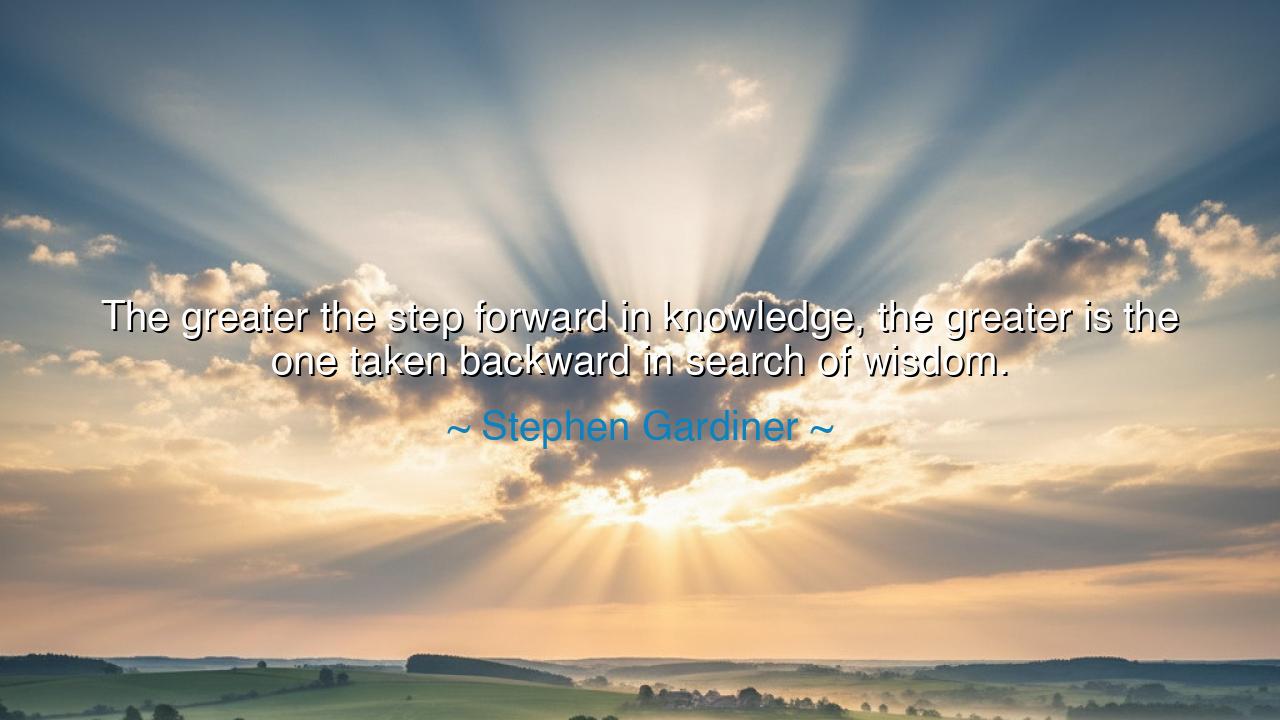
The greater the step forward in knowledge, the greater is the one
The greater the step forward in knowledge, the greater is the one taken backward in search of wisdom.






When Stephen Gardiner declared, “The greater the step forward in knowledge, the greater is the one taken backward in search of wisdom,” he spoke as one who had gazed upon the double-edged nature of progress. His words are a lament and a revelation — that knowledge, though ever advancing, often leaves behind the quiet companion that gives it meaning: wisdom. In this simple truth lies the eternal paradox of human civilization — that as our hands reach further into the stars, our hearts must dig deeper into the soil of our being. The more we learn of the world, the more we must remember what it means to be human.
The origin of this insight can be found in Gardiner’s own background as an architect and thinker, one who saw both the triumphs and the perils of modern advancement. He understood that knowledge is power — a force that builds cities, harnesses energy, and bends nature to man’s will. Yet he also saw that this same force, without balance, can estrange man from himself. In the march of technology and intellect, wisdom often retreats, for wisdom requires reflection, humility, and reverence — qualities that progress too easily forgets. Thus, Gardiner’s statement stands not as criticism of learning, but as a warning: that every step forward in understanding the outer world must be matched by a step inward toward understanding the soul.
This truth is as old as civilization itself. The ancients knew that wisdom and knowledge are not the same. Knowledge is the gathering of facts, the mastery of technique; wisdom is the art of using that mastery rightly. The philosopher Socrates once said, “The only true wisdom is in knowing you know nothing.” And in those few words lies the same spirit that Gardiner captured centuries later. For as knowledge increases, so too does the realization of its limits — that the more we know, the more we see how much lies beyond our reach. Every scientific discovery opens a hundred new questions; every invention brings new responsibilities. Thus, the wise must walk hand in hand with the learned, lest progress outpace conscience.
History provides countless examples of this truth. In the twentieth century, humanity unlocked the atom, mastering the very building blocks of creation. Yet in the same breath, it unleashed the atomic bomb, the most destructive force ever known. Knowledge advanced, but wisdom faltered — and for a time, the world trembled at its own brilliance. Similarly, we entered the digital age, weaving a web of connection across the globe, only to find ourselves entangled in distraction, isolation, and falsehood. These are not failures of intellect, but failures of balance — moments when man’s reach exceeded his readiness to wield what he had found. Gardiner’s words echo through such moments like a bell of conscience: that every gain in knowledge must be met by a deeper search for meaning.
The ancients would have understood this. The Greeks spoke of hubris, the arrogance that follows great achievement, and nemesis, the inevitable downfall that humbles it. The same pattern repeats through time: empires that conquer the world lose their souls; societies that master nature forget to honor it. In every age, the march of progress demands a counter-march of reflection. Wisdom is not found in the laboratories, but in the heart’s stillness; not in data, but in discernment. Without it, even the most enlightened civilization becomes blind.
Gardiner’s quote is thus a call to harmony — a reminder that knowledge and wisdom are twins, born of the same pursuit but walking different paths. Knowledge looks outward, to what can be measured and controlled; wisdom looks inward, to what can be understood and cherished. When they walk together, humanity flourishes; when they part, chaos follows. To move forward in one without advancing in the other is to build a house without a foundation — impressive in form, but fragile in soul.
So let this be the lesson passed down to all who seek learning: seek not knowledge alone, but the wisdom that gives it light. Study the sciences, but also study the self. Build machines, but build also the virtues to govern them. Reflect before you act, and listen before you speak. For every great step forward in discovery must be matched by a humble step backward into reflection. As Stephen Gardiner reminds us, progress without wisdom is motion without direction — and it is only when we remember the depths of our humanity that we can truly rise toward the heights of truth.






AAdministratorAdministrator
Welcome, honored guests. Please leave a comment, we will respond soon